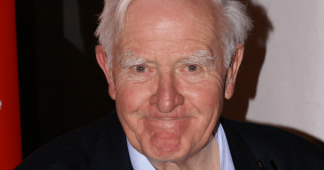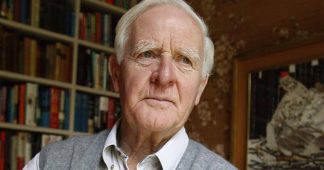by James Baillie
Dec. 14, 2020
John le Carré was a former British spy who rose to prominence thanks to his best-selling novels capturing the paranoia of the Cold War. Starting with his breakout bestseller, The Spy Who Came In From The Cold, in 1963, le Carré’s spies inhabited a ‘wilderness of mirrors’, a bleak world of double-agents and treachery.
John le Carré died on Sunday after a short illness at the age of 89. Facts about his life are notoriously hard to ascertain given that he tended to give several different versions of events in interviews.
This subterfuge included initially denying that he had had anything to do with the intelligence services before finally admitting that he had in fact worked for British intelligence for a number of years, both in the UK and under diplomatic cover in Germany.
Despite such disinformation, it seems that there are some facts about le Carré’s life that can be established:
1 John le Carré does not actually exist but is the pen name of David Cornwell who thought that giving his name “a slightly foreign look” would help people remember it.
2 Le Carré was a spy and actually spied for three different branches of intelligence. While in the army in the early Fifties, le Carré joined the Intelligence Corps and worked as a field security officer in Graz, Austria, a period he wrote about in his semi-autobiographical 1986 novel A Perfect Spy. He later joined the British domestic intelligence service MI5 in 1958 before switching to the foreign intelligence service SIS (MI6) in 1960 having concluded that MI5 was “a dead-end sort of place”.
3 He had a troubled upbringing. His father Ronnie associated with gangsters including London’s notorious Kray twins, and Ronnie was jailed for fraud on several occasions. His father had “infinite powers of self-delusion”, le Carré wrote in the New Yorker.
4 Le Carré’s spying career in effect was ended by KGB agent Kim Philby, a high-ranking British intelligence officer who was secretly working for the Soviet Union, le Carré told Channel 4 in 2010.
5 He invented the language of spies and of spying. The term “mole” meaning “double agent” was popularised by le Carré’s best-selling novel Tinker, Tailor, Soldier, Spy. Le Carré’s term “honey-trap” has also been adopted by the global intelligence community.
6 He once danced with Palestinian leader Yasser Arafat at a party in Lebanon while researching his novel The Little Drummer Girl about the Israeli-Palestinian conflict.
7 Perhaps surprisingly for a man who has spent so much of his life in the shadows, le Carré has appeared on screens both large and small. He crops up in the film adaptations of Tinker, Tailor, Soldier, Spy and The Little Drummer Girl. He also appears in the TV adaptation of The Night Manager.
8 His first job was washing elephants at the zoo in Berne, Switzerland where he went to university to study German literature in the late Forties.
9 In later life le Carré was strongly opposed to the Iraq war as he believed the reasoning behind the war was based on faulty intelligence.
10He spoke French and German fluently and, before becoming a successful writer, he taught both languages at top fee-paying school Eton, to students including Stanley Johnson, the father of the present British Prime Minister.
Le Carré’s varied experiences translated into his novels. Speaking on BBC Radio 5 Live this morning, historian and writer Ben Macintyre praised le Carré for his insights into “the knotted timber of human personality”. “He was often described as a spy writer, but he was far more than that,” Macintyre said. “He was really a student of and expert in the human condition.”
Published at sputniknews.com











